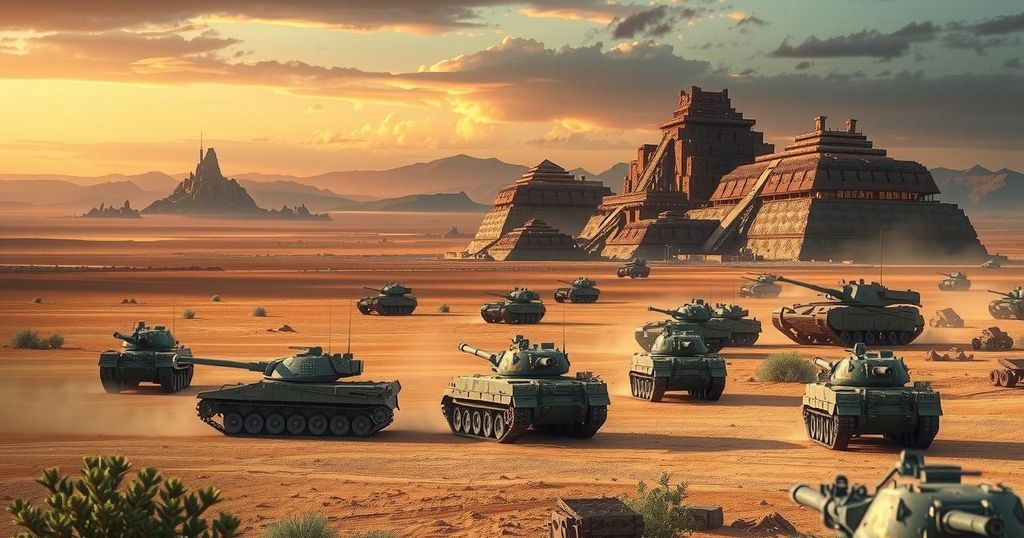Congo’s President Félix Tshisekedi has appealed for mass military enlistment to combat advancing M23 rebels, backed by Rwanda, following their occupation of Goma. Regional tensions are escalating amid calls for ceasefire and dialogue. South African officials have criticized Rwanda’s involvement, while analysts point to the historical context of the conflict and its ties to resource control in eastern Congo.
President Félix Tshisekedi of the Democratic Republic of Congo has made a clarion call to the nation’s youth to enlist en masse in the military to confront the advancing M23 rebels allegedly supported by Rwanda. His remarks follow the rebels’ consolidation of control over much of Goma, a key strategic city in eastern Congo, with Tshisekedi promising a significant military response while still advocating for potential peaceful negotiations with the insurgents.
The M23 group, which has reportedly received assistance from around 4,000 Rwandan troops, poses a significant challenge, as it aims to gain territory in eastern Congo, known for its rich mineral resources valued at approximately $24 trillion. The call to action coincides with heightened tensions as neighboring countries urge the Congolese government to engage in dialogue with the rebels amidst fears of regional conflict.
The situation is dire in South Kivu where the M23’s advances have sparked panic among locals. The Congolese military is under significant strain, following a withdrawal of foreign contractors, which has severely weakened its defensive capabilities. Reports indicate that military bases in key areas have been abandoned as forces regroup in strategic locations to fend off the M23 advance toward Bukavu.
The East African regional summit has called for an immediate ceasefire and has pressed Congo’s government to commence discussions with the rebels. Tshisekedi notably did not attend this virtual summit, which included participation from Rwandan representatives, as both nations grapple with the implications of the ongoing conflict.
Accusations have arisen from South African officials directed at Rwandan forces for their involvement in the conflict, which has led to the deaths of 13 South African peacekeepers. Rwandan President Paul Kagame has returned fire, labeling these peacekeepers as a “belligerent force,” and has expressed Rwanda’s readiness to confront any aggression.
Analysts emphasize the underlying motives for the conflict relate to the vast mineral wealth in eastern Congo. M23’s ambitions appear to extend beyond military dominance, aiming to establish a formal administrative presence in the region, claiming to protect ethnic Tutsis. The historical context rooted in the Rwandan genocide underscores the complexity and depth of the current crisis.
Experts from the Crisis Group highlight a significant failure of regional mediation efforts, remarking on the acrimonious statements exchanged between Rwanda and Congo, which foreshadowed the current escalation. Attention is drawn to an urgent need for effective dialogue and conflict resolution to avert further deterioration of the situation.
The conflict in eastern Congo is deeply intertwined with historical ethnic tensions stemming from the Rwandan genocide of 1994, during which conflicts arose regarding the Tutsi population and their treatment by Hutu militias. The M23 group, representing primarily Tutsi interests, asserts that its actions are a response to perceived persecution. Efforts to mediate and achieve peace have historically been marred by ineffectiveness, leading to repeated escalations of violence and territorial disputes over the region’s valuable resources.
In summary, Congo is facing a critical military and humanitarian crisis as M23 rebels, supported by Rwandan forces, expand their territorial control. President Tshisekedi’s call for mass enlistment in the army reflects an urgent need for military and diplomatic measures to confront the crisis. The geopolitical dynamics reveal the complexities of historical grievances intertwined with struggles over valuable resources, highlighting the necessity for substantive peace negotiations to stabilize the region.
Original Source: apnews.com






